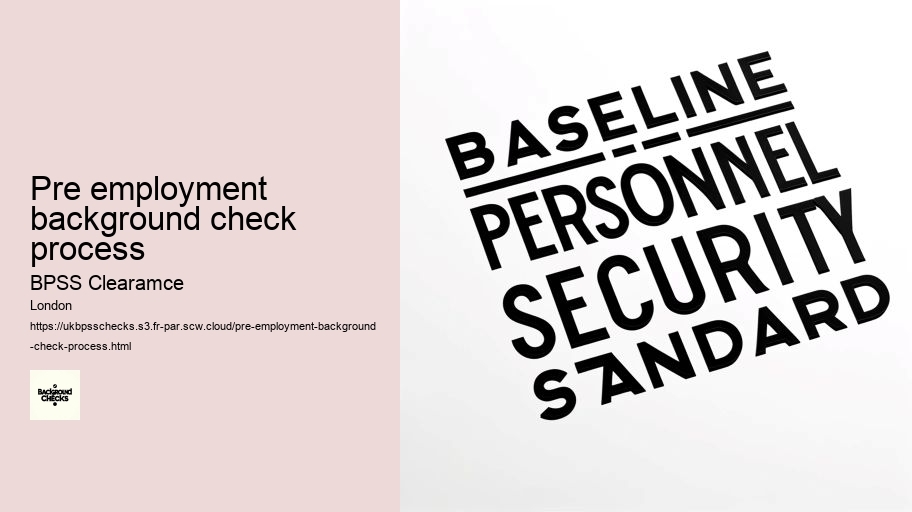
Employers in these sectors may request BPSS checks to ensure that their potential or current employees meet the necessary security standards to protect against risks such as espionage, terrorism, or sabotage.
The role of verifying the right to work is a crucial component of the Baseline Personnel Security Standard (BPSS) checks in the UK.
- Report any changes in personal circumstances that may affect your clearance status promptly.
The primary purpose of BPSS checks is to establish a reliable baseline of security clearance for individuals to ensure they meet specific standards of trustworthiness, integrity, and reliability. By screening candidates before employment, organizations mitigate risks associated with unauthorized access to sensitive information, corruption, and potential threats to public safety.
Organizations that require a Baseline Personnel Security Standard (BPSS) check generally include those involved with national security, government contracts, or any sector where security is paramount. This typically encompasses various government departments, the defense sector, and private companies that handle sensitive information or deliver services under government contracts.
When aiming for BPSS clearance, ensuring you have the right documents is paramount. Your proof of identity, employment history, and national and immigration status play an essential role in this process. However, delving into the specifics of unspent criminal records and time spent abroad might hold the key to your successful clearance. Each document serves as a puzzle piece in the larger picture of your suitability. Remember, attention to detail in gathering these documents could be the difference-maker in your clearance journey.

Ultimately, BPSS clearance plays a critical role in maintaining a secure work environment, reducing risks, and building trust in recruitment processes and decision-making.
Continuous monitoring and updating of BPSS clearance are recommended for roles that involve ongoing security concerns. This proactive approach ensures that any changes in an employee's background that could affect their security status are promptly addressed, maintaining the integrity of sensitive environments and protecting national interests.
Unlike some checks such as the Disclosure and Barring Service (DBS), which may concentrate more on criminal history, BPSS covers a broader spectrum of aspects essential for certain roles requiring access to sensitive information.
2. Renewal is required after the 3-year period to maintain access to government assets.
It's essential to be forthcoming with this information to facilitate a smooth and thorough BPSS clearance process.
Verifying your time spent abroad enables a thorough background check to determine your integrity and identify any security risks that may arise from those stays. Ensuring transparency in disclosing your overseas experiences is crucial for upholding the effectiveness and integrity of the BPSS clearance process.


3. Some organizations may mandate more frequent renewals based on internal policies.
Training for HR personnel on the specifics of BPSS clearance is essential to ensure that all aspects of the vetting process are conducted correctly. Proper training helps mitigate the risk of errors or oversights that could compromise the security of the vetting process and ultimately, the organization's operations.
BPSS checks are typically required for individuals working in, or on behalf of, the UK government. This includes various roles within the public sector, such as in defense, health services, and law enforcement. Additionally, private sector employees who are contracted to work on government projects that require access to sensitive or classified information also need to undergo these checks.
NHS staff, particularly those in positions with access to personal and sensitive patient data, require BPSS clearance to protect patient confidentiality and ensure the integrity of medical services.
Depending on the severity and nature of the crime, certain offenses may disqualify individuals from obtaining BPSS clearance. It's paramount to be transparent and disclose any unspent criminal records when applying for BPSS to uphold integrity. Individuals with unspent criminal records may face additional scrutiny or even be rendered ineligible for roles requiring BPSS clearance.
BPSS checks are designed to serve as a preliminary screening for individuals seeking to work in sensitive or secure environments, particularly within the government or its contractors. The BPSS is primarily concerned with establishing a baseline of trustworthiness and integrity, ensuring that all employees meet a standard level of security before they commence employment.

Organizations that fail to properly conduct BPSS clearance may face significant risks, including security breaches and legal consequences. Ensuring that all employees undergo BPSS clearance before taking on roles that involve access to sensitive information is key to maintaining operational security and complying with national security regulations.
The enforcement of BPSS clearance is indirectly related to the Official Secrets Act, which provides a legal foundation for protecting state secrets and national security information. Individuals undergoing BPSS checks must often comply with the stipulations of this act, as it forms the legal backdrop against which security breaches are adjudged.
Regarding regulatory compliance, both standards must adhere to the UK's data protection laws, including GDPR. However, BS7858:2019 also outlines specific storage and handling procedures for the sensitive information gathered during the vetting process, reflecting its more rigorous data collection.
BPSS stands for "Baseline Personnel Security Standard." It's essentially a basic level of security clearance required for individuals working in roles that involve access to sensitive information or facilities, especially in the public sector. The BPSS checks typically include identity verification, employment history checks, and criminal record checks.
No, BPSS (Baseline Personnel Security Standard) and DBS (Disclosure and Barring Service) are not the same.
BPSS (Baseline Personnel Security Standard): This is a set of government guidelines in the United Kingdom for ensuring the security clearance of individuals working with sensitive information or in certain roles. It is a basic level of security clearance and involves checks such as identity verification, employment history, and criminal record checks. BPSS is often required for roles in both the public and private sectors where access to sensitive information or facilities is involved.
DBS (Disclosure and Barring Service): This is a government agency in the UK that performs checks on individuals working with children or vulnerable adults. The DBS conducts criminal record checks (previously known as CRB checks) to help organizations make safer recruitment decisions by identifying candidates who may be unsuitable for certain roles due to past criminal convictions, cautions, reprimands, or warnings.
While both BPSS and DBS involve background checks, they serve different purposes and are used in different contexts. BPSS focuses on security clearance for a broader range of roles, including those involving access to sensitive information, while DBS specifically focuses on roles involving work with vulnerable groups.
The Baseline Personnel Security Standard (BPSS) checks typically include:
Identity Verification: Verifying the identity of the individual through official documents such as passports, driver's licenses, or other government-issued identification.
Employment History Checks: Verifying the individual's employment history to ensure accuracy and assess their suitability for the role.
Criminal Record Checks: Checking for any criminal convictions or cautions. This is often done through a Basic Disclosure from the Disclosure and Barring Service (DBS) in England and Wales, Disclosure Scotland in Scotland, or AccessNI in Northern Ireland.
Verification of Address: Verifying the individual's current and previous addresses to ensure accuracy and completeness of their background information.
These checks are aimed at establishing a baseline level of trustworthiness and suitability for individuals working in roles that require access to sensitive information or facilities, particularly within the public sector but also in some private sector positions.
A valid proof of address for a Baseline Personnel Security Standard (BPSS) check typically includes official documents that clearly display the individual's name and current address. Common examples of acceptable proof of address documents may include:
Utility Bills: Recent bills for services such as electricity, gas, water, or landline phone, issued within the last three to six months.
Bank Statements: Recent bank statements, typically issued within the last three to six months, showing the individual's name and address.
Official Letters: Letters from government agencies, local authorities, or financial institutions, such as tax statements, council tax bills, or letters from the Department for Work and Pensions (DWP), which display the individual's name and address.
Tenancy Agreements: A signed and dated rental or lease agreement for accommodation, showing both the tenant's and landlord's details, along with the property address.
Mortgage Statements: Statements from a mortgage provider showing the individual's name and property address, issued within the last three to six months.
It's important to note that the specific requirements for proof of address may vary depending on the organization conducting the BPSS check. Additionally, the document should be recent and not expired, and it should clearly display both the individual's name and current address.
A Baseline Personnel Security Standard (BPSS) check is typically required for individuals working in roles that involve access to sensitive information or facilities, particularly within the public sector but also in some private sector positions. While specific requirements may vary depending on the organization and the nature of the role, BPSS checks are commonly needed for individuals who:
In summary, individuals who require a BPSS check are those whose roles involve a level of trust, responsibility, and access to information or facilities that necessitate verification of their identity, employment history, and suitability for the position.
The Baseline Personnel Security Standard (BPSS) does not have an expiry date like some other security clearances. Instead, it serves as a foundational level of security clearance that establishes an individual's baseline trustworthiness and suitability for roles requiring access to sensitive information or facilities.
However, while the BPSS itself does not expire, organizations may have their own policies regarding the periodic review or renewal of security clearances for their employees. For instance, some employers may require employees to undergo regular rechecks or refreshes of their background checks, including BPSS checks, to ensure that their security clearance remains up to date.
Therefore, although the BPSS clearance itself doesn't have a fixed duration, individuals and organizations should be aware of any policies or requirements related to maintaining and updating security clearances in accordance with best practices and organizational guidelines.